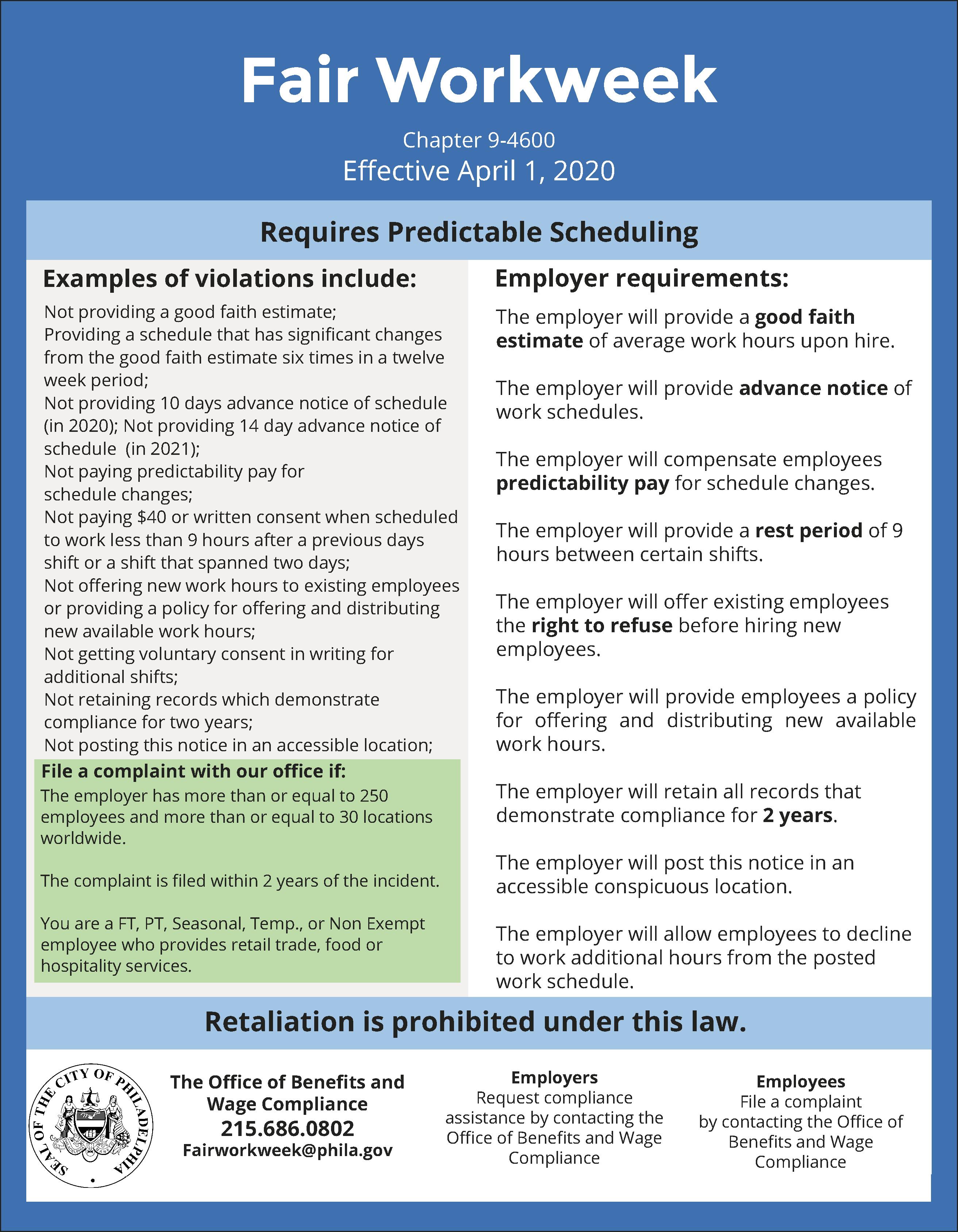

A Refresher on Philadelphia’s Fair Workweek Employment Standards Ordinance

In what seems like several lifetimes ago, on December 16, 2018, we wrote about the Philadelphia City Council passing the Fair Workweek Employment Standards Ordinance. The Ordinance requires certain employers in the hospitality, retail, and food services industries to comply with scheduling and predictability pay requirements. Although the Ordinance went into effect on April 1, 2020, as with many other things, due to the COVID-19 pandemic, the enforcement of the predictability pay requirement portion of the Ordinance was delayed.
Given that the Office of Worker Protections began enforcement of the predictability pay requirement on June 1, 2021, now is a great time to get up-to-speed on the requirements under the Ordinance.
Who Is Covered by the Ordinance?
The Ordinance applies to hospitality, retail, and food services establishments that employ 250 or more employees anywhere in the world and have at least 30 locations worldwide, including franchises and chains. All employees performing work for compensation on a full-time, part-time, or temporary basis should be factored into the count.
Covered employees are those who work for an employer defined above within the boundaries of the City of Philadelphia and who are required to be paid overtime. This includes full-time employees, part-time employees, and seasonal and temporary workers so long as their job duties include retail, food, or hospitality services.
What is Predictability Pay?
Predictability pay is compensation that is required under the Ordinance to be paid to an employee as compensation for certain changes made by the employer to the employee’s work schedule. This compensation must be paid to the employee in addition to the ordinary wages earned by the employee for the work the employee performs.
When Must an Employee Be Paid Predictability Pay?
Effective April 1, 2020, upon hiring, all employees must receive a “good faith estimate” of their work schedule, including the average number of hours they can expect to work each week over a typical 90-day period, whether they can expect to work on-call shifts, and certain days, times, and shifts the employee can typically be expected to work (or will not be expected to work). After an employee is hired, the Ordinance requires employers to provide written notice of an employee’s work schedule at least 14 days in advance. The posted work schedule must include the employee’s shifts at that worksite, and whether or not the employee is scheduled to work or be on-call that week. Employees must be compensated for each employer-initiated change to the posted work schedule that occurs more than 24 hours after the 14-day advance notice deadline. The notice must be provided in a conspicuous and accessible location where employee notices are customarily posted. If notices are usually posted electronically, all employees in the workplace must have access to it on-site as well.
There are certain employee-initiated instances that may result in a change in schedule for which predictability pay is not required. These include when an employee:
- Requests a shift change by written communication (if the request is not in writing, it does not qualify for the exemption from Predictability Pay);
- Trades shifts with or seeks coverage by another employee;
- Begins or ends work no more than twenty minutes before or after the scheduled start or end time of the shift;
- Volunteers to work additional hours in response to a mass written communication from the employer about the availability of additional hours on a voluntary basis due to another employee being unable to work scheduled hours.
Predictability pay also is not required when:
- Employee hours are subtracted due to termination of employment;
- Changes are made to the posted work schedule within 24 hours after the advance notice required is provided;
- The employer subtracts hours from an employee’s work schedule for disciplinary reasons pursuant to a multi-day suspension, provided the employer documents in writing the incident leading to the disciplinary action;
- A ticketed event is canceled, scheduled, rescheduled, postponed, delayed, increases in expected attendance by 20% or more, or increases in duration, due to circumstances that are outside the employer’s control and that occur after the employer provides the posted work schedule; or
- A hotel banquet event is scheduled, due to circumstances that are outside the employer’s control, after the employer provides the posted work schedule with the advance notice.
Predictability pay also is not required in certain emergency situations, for example, when the employer’s operations cannot begin or continue due to a fire, flood, or another natural disaster, a state of emergency, or when there are severe weather conditions that disrupt transportation or pose a threat to employee safety.
How Much Predictability Pay Must Employees Be Paid?
An employee is entitled to one additional hour of pay at the employee’s regular rate of pay when the employer adds time to a work shift or changes the date, time, or location of a scheduled work shift, with no loss of hours. If the employee does not work certain scheduled hours because these hours were subtracted from the employee’s regular or on-call shift, or their regular or on-call shift is canceled, an employee must be compensated at no less than one-half times the employee’s regular rate of pay per hour for any scheduled hours the employee does not work.
What Else Does the Ordinance Require?
Effective April 1, 2020, the Ordinance permits employees to decline work hours that are less than 9 hours after the end of a previous day’s shift, or during the 9 hours following the end of a shift that spanned two days. However, an employee may consent to these shifts if his or her consent is provided in writing. If an employee voluntarily works these shifts, the employee must be compensated an additional $40 per shift.
The Ordinance also provides that a covered employer must provide written notice of available
work shifts to existing employees at least 72-hours in advance (unless a shorter period is necessary for the work to be completed) before hiring subcontractors or new employees from an external applicant pool. The notice:
- Must be in English and in the primary language or languages of the employees at the particular workplace and posted in a conspicuous location at the workplace that is readily accessible and visible to all employees;
- Must also be provided electronically to each employee if the employer normally communicates scheduling electronically; and
- Must include a description of the position and its required qualifications, the schedule of available shifts, the length of time the employer anticipates requiring coverage of the additional hours, and the process by which employees may notify the employer of their desire to work the offered shifts.
If current employees accept available shifts, then an employer cannot hire new employees to work those shifts. But, if no current employees accept the shifts within 24 hours of the end of the required 72-hour notice period, the employer receives written confirmation that no eligible employees are interested in the available shifts, or some employees accepted a subset of shifts, but other shifts remain outstanding, then external applicants may be offered the available shifts.
The obligation to offer work to existing employees does not apply if giving employees the available shifts would cause the employer to pay overtime.
An employer must notify an employee by written communication of its policy for offering and distributing work shifts pursuant to the Ordinance at the time of hire and within 24 hours of any change in the policy. This notice must delineate:
- Where employees can access written notices of available work shifts;
- The process by which employees may notify the employer of their desire to work the available work shifts; and
- The criteria for distribution of work shifts among qualified and interested employees.
Additionally, the Ordinance includes a “rebuttable presumption” of retaliation if the employer takes adverse action against an employee within 90 calendar days of the employee’s exercise of rights protected under the Ordinance unless the termination is due to disciplinary reasons for just cause, provided the employer documents, in writing, the incident relating to the employee’s discipline.
The Fair Workweek Employment Standards Ordinance has additional record-keeping and notice requirements contained within it. For example, covered employers must post and keep posted, inconspicuous and accessible places on the premises of the employer where notices to employees and applicants for employment are customarily posted - a notice setting forth the rights and privileges provided to employees under the Ordinance which states that retaliation against employees for exercising such rights is prohibited.
The City has published a poster that can be used to satisfy this notice requirement. 
Covered employers also are required to keep records necessary to demonstrate compliance with the Ordinance, including but not limited to good faith estimates of work schedules and any modifications thereto, written consent for work shifts, offers of work shifts to existing employees, and responses to those offers, and payroll records that specify the amount of additional compensation paid to employees under the Ordinance. These records should be kept for two years. When an employer is accused of not complying with the Ordinance, if the employer does not maintain or retain adequate records documenting compliance, or does not allow the Office of Worker Protection reasonable access to such records within 30 days of its request, it shall be presumed that the employer has violated the Ordinance, absent clear and convincing evidence otherwise.
With respect to remedies, the Ordinance allows employees to bring administrative complaints and private actions that can result in damages for any unpaid compensation, including lost wages and benefits, liquidated damages of up to $2,000, and reasonable attorney’s fees and costs. By regulation and pursuant to the Ordinance, the Office of Worker Protections also has fixed an amount of presumed damages to be awarded to an employee for certain violations. For example, for a written good-faith estimate of an employee’s work schedule that is incomplete or lacks a good faith basis, damages of $200 per impacted employee may be imposed.
Next Steps for Employers
Employers covered by this Ordinance should be sure to review the Ordinance and consult with counsel to ensure compliance. If not already done, covered employers also should be sure to revise existing policies and procedures as they relate to record-keeping, compensation, and scheduling and be sure to train managers and supervisors to comply with the requirements of the Ordinance going forward.
Disclaimer: This post does not offer specific legal advice, nor does it create an attorney-client relationship. You should not reach any legal conclusions based on the information contained in this post without first seeking the advice of counsel.

